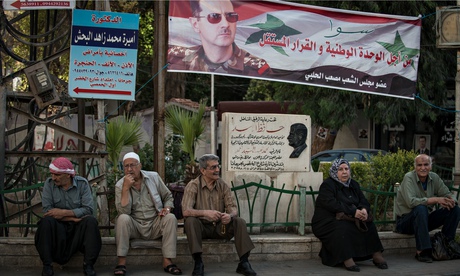
Syrians in Damascus sit beneath a banner of Bashar al-Assad ahead of the presidential election on 3 June. Photograph: Xinhua/Landov/Barcroft Media
What an irony. Fear of the Syrian government and its many-tentacled security apparatus is even greater now than it was before the revolution began. Why should that be? The government is generously offering "reconciliation" deals across the country, with gracious amnesties like the one that enabled several hundred rebel fighters to leave the exhausted city of Homs with light weapons in early May. Yet anyone who knows Syria from the inside knows full well that the Assad regime's generosity and grace is to be feared above all else.
When peaceful calls for dignity and reform were met in March 2011 by crushing violence from the outset, the protesters knew what awaited them if they were arrested. Their bravery in breaching the fear barrier even to take part in such demonstrations is beyond admirable. Tens of thousands have gone missing over the past three years, detained in prison, never seen again, or sometimes simply returned to their families in a body bag as a warning, like the mutilated body of 13-year-old Hamza al-Khatib, early icon of the revolution. Like so many, Hamza was not even demonstrating – he was simply in the wrong place at the wrong time.
As the presidential election is held tomorrow in regime-held areas only, Syrians know full well what it means. It is not so much an election – everyone knows the result after all – it is more like a head count of government supporters. To vote for anything other than Bashar al-Assad is to sign your own death warrant and that of your family, and not to vote at all means you are forfeiting your chance of any kind of future in Syria.
Of Syria's 23 million population, 4 million are estimated to have left and 9 million are thought to be internally displaced. At least a further million have lost their identity papers in the fighting and are thereby disqualified. Refugees outside the country who fled "illegally" are not eligible to vote, thereby ensuring a situation cannot arise where one of Bashar's two opponents might actually win abroad.
"Legal" expatriate Syrians can vote in Syrian embassies in certain selected countries like Russia and Romania, and those living in a country where the embassy is closed, like the UK, have been cordially invited back to Syria "to exercise their civil right". Some have taken up the offer knowing that they must, if they ever wish to return to their country while the Assad regime still holds sway. In Paris I was reliably informed of one Syrian who went – not to vote, because France has banned the embassy from participating – but to renew his passport. Known to be anti-regime, he had his passport torn up in front of him and was told: "There – now go and get yourself a new passport from your Friends of Syria."
In Britain we face no repercussions for not voting; in Syria it is very different. The message is: "If you are not for us, you are against us." We in the west may dismiss the Syrian election as an absurd process, a mockery of democracy. We have that luxury. But fear is forcing thousands to vote for Assad whose tender mercies are well known. Stories are circulating about the ways in which the regime seeks to take revenge on those whom it considers have betrayed it. Even those who have done nothing and never taken sides are at risk – all it takes is one report written by one security official who takes a dislike to you. It has already happened to several of my neutral Syrian friends.
While western democracies will scoff at Syria's election process, Russia and Iran will use it to their advantage. It plays beautifully into their narrative of supporting "whoever is elected by the Syrian people" and legitimises their unwavering support for Assad.
Syria has lost about 40% of its GDP since 2011, according to the Damascus-based Syrian Center for Policy Research in conjunction with the UN and the IMF. Eleven million have lost their livelihood. Fear of losing their right ever to live in their country again is driving them to vote. Hard as it may be for us to grasp, for them it is a vote for life or death.

No comments:
Post a Comment